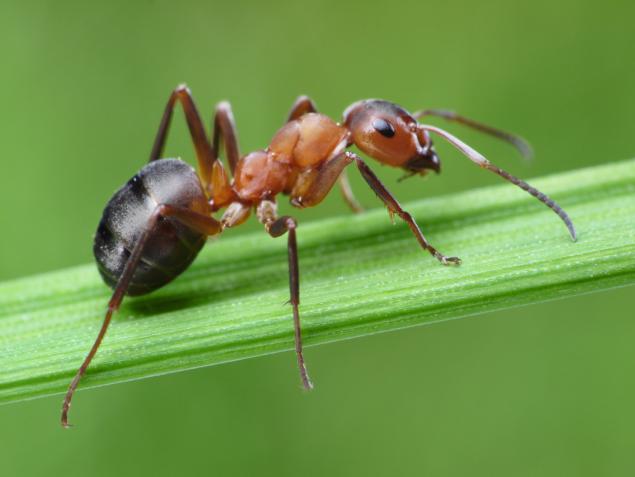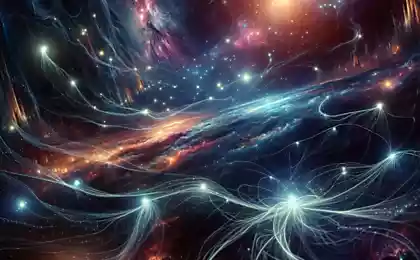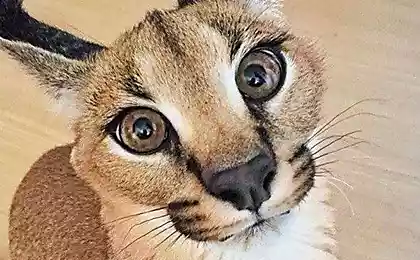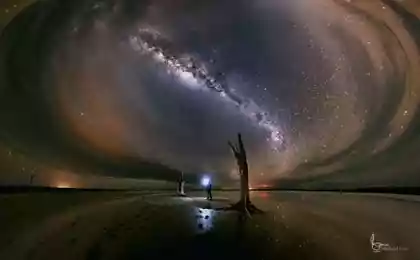700
10 exciting mysteries of life that science can not explain
Life is mysterious and delicious! The site publishes a list of exciting puzzles to unravel which we have not yet approached any shag.1. Cows that graze, always looking to the north or yugUchenye recently discovered a detail that is not noticed over the millennia: cow resting or grazing standing along the Earth's magnetic poles head north or south. The scheme remains the same regardless of wind or other factors, and no one knows why.
2. Why do some mammals returned to the water? We know that marine animals came out of the water, and they were of course, allows to move around the earth. It was a wise move, since the land contained a large amount of resources that are ideal for a successful evolution. But why are some of these animals, such as the ancestors of whales or seals, returned to the water remains unknown.
3. Al aloidy in rasteniyahAl * * aloidy - are natural compounds found in plants, the most common of which - pestilence * in. * Al aloidy special ("NAR * otic") acts on animals and humans. And although we have studied them in some detail, but still do not quite understand why they need to plants.
4. Why do the flowers everywhere? Flowering plants form a class of angiosperms, and as you may have noticed, they are everywhere. Surprisingly, it was not always. Flowering plants about 400 million years ago in a short period of time replaced the other types of plants, and as a result today account for about 90% of all plant species.
This problem is so worried about Charles Darwin, he called it a "terrible secret».

5. Why reigns near the equator such diversity? About 200 years ago, the Prussian explorer Alexander von Humboldt first discovered that biodiversity is increasing as we approach the equator. Nature and human culture is becoming more diverse and colorful, as well as the disease.
There are about three dozen theories, trying to find the answer to this question, but the consensus among scientists or not.
6. fitoplanktonaFitoplankton paradox - a class of organisms found in large bodies of water, and includes a wide range of different subspecies. This is an extremely diverse group, and the diversity of these organisms defies evolution and natural selection. The lack of resources makes it impossible to survive in the ecosystem of the large number of different organisms without destroying each other. But somehow they do exist.
7. How to create a colony of Argentine ants on different kontinentahArgentinskie ants - the only species besides humans that managed to colonize the three continents. All three supercolonies Argentine ants in Europe, South America and Asia consists of ants, which are essentially the same population. Ants immediately recognized his brothers every time turn out to be close, but ants are aggressive with other species. This, to put it mildly, strange considering the great distances that separate supercolonies.

8. The mysterious ancestor chelovekaKogda scientists studied the DNA denisovan (denisovets - kind of fossil hominid closely related to Neanderthals and named after the caves, which was first found), they found traces of the mysterious species that science has not been able to identify. Although denisovtsa also surrounds mystery, but at least we know who he was and where occurred. But we can not say the same about the unknown species with which they are bred about 30 000 years ago, which left a clear mark on the DNA denisovtsa. All that we know - this is what they gave denisovan set of teeth, found nowhere else in the animal kingdom.
9. The animals that can live without kislorodaVse were shocked when deep in the Mediterranean Sea were found oxygen-free animals. Among complex multicellular animals is unheard of. It is the type loritsifer very small animals that once lived in the air, but in the end adapted themselves to the new environment in which oxygen was replaced by salts.
Science does not know other complex organisms that live in oxygen-free environment, and we have no idea about their evolutionary history.
10. Sexual razmnozhenieZa except for some microbes and plants, almost all live in the world of sexually reproducing. If you think about it, this is a huge evolutionary anomaly. The whole kind of half - males - are unable to produce offspring, using the same amount of resources from the environment, and that the females. Why then was to make as much effort to develop a mechanism that looks like an obvious disadvantage? .. It is not known.
via listverse.com/2015/04/10/10-fascinating-mysteries-of-life-that-science-cant-explain/
2. Why do some mammals returned to the water? We know that marine animals came out of the water, and they were of course, allows to move around the earth. It was a wise move, since the land contained a large amount of resources that are ideal for a successful evolution. But why are some of these animals, such as the ancestors of whales or seals, returned to the water remains unknown.
3. Al aloidy in rasteniyahAl * * aloidy - are natural compounds found in plants, the most common of which - pestilence * in. * Al aloidy special ("NAR * otic") acts on animals and humans. And although we have studied them in some detail, but still do not quite understand why they need to plants.
4. Why do the flowers everywhere? Flowering plants form a class of angiosperms, and as you may have noticed, they are everywhere. Surprisingly, it was not always. Flowering plants about 400 million years ago in a short period of time replaced the other types of plants, and as a result today account for about 90% of all plant species.
This problem is so worried about Charles Darwin, he called it a "terrible secret».

5. Why reigns near the equator such diversity? About 200 years ago, the Prussian explorer Alexander von Humboldt first discovered that biodiversity is increasing as we approach the equator. Nature and human culture is becoming more diverse and colorful, as well as the disease.
There are about three dozen theories, trying to find the answer to this question, but the consensus among scientists or not.
6. fitoplanktonaFitoplankton paradox - a class of organisms found in large bodies of water, and includes a wide range of different subspecies. This is an extremely diverse group, and the diversity of these organisms defies evolution and natural selection. The lack of resources makes it impossible to survive in the ecosystem of the large number of different organisms without destroying each other. But somehow they do exist.
7. How to create a colony of Argentine ants on different kontinentahArgentinskie ants - the only species besides humans that managed to colonize the three continents. All three supercolonies Argentine ants in Europe, South America and Asia consists of ants, which are essentially the same population. Ants immediately recognized his brothers every time turn out to be close, but ants are aggressive with other species. This, to put it mildly, strange considering the great distances that separate supercolonies.

8. The mysterious ancestor chelovekaKogda scientists studied the DNA denisovan (denisovets - kind of fossil hominid closely related to Neanderthals and named after the caves, which was first found), they found traces of the mysterious species that science has not been able to identify. Although denisovtsa also surrounds mystery, but at least we know who he was and where occurred. But we can not say the same about the unknown species with which they are bred about 30 000 years ago, which left a clear mark on the DNA denisovtsa. All that we know - this is what they gave denisovan set of teeth, found nowhere else in the animal kingdom.
9. The animals that can live without kislorodaVse were shocked when deep in the Mediterranean Sea were found oxygen-free animals. Among complex multicellular animals is unheard of. It is the type loritsifer very small animals that once lived in the air, but in the end adapted themselves to the new environment in which oxygen was replaced by salts.
Science does not know other complex organisms that live in oxygen-free environment, and we have no idea about their evolutionary history.
10. Sexual razmnozhenieZa except for some microbes and plants, almost all live in the world of sexually reproducing. If you think about it, this is a huge evolutionary anomaly. The whole kind of half - males - are unable to produce offspring, using the same amount of resources from the environment, and that the females. Why then was to make as much effort to develop a mechanism that looks like an obvious disadvantage? .. It is not known.
via listverse.com/2015/04/10/10-fascinating-mysteries-of-life-that-science-cant-explain/
10+ unexpected facts about the Queen of England
20+ Quick facts about bananas that will convince you to eat them as often as possible
























